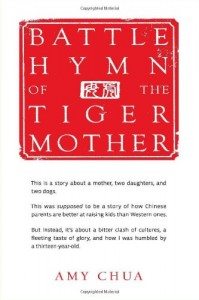Adult Non-Fiction: Battle Hymn of the Tiger Mother A.K.A. Ambitious Bully
 Battle Hymn of the Tiger Mother written by Amy Chua
Battle Hymn of the Tiger Mother written by Amy Chua
Non fiction parenting book published by Penguin Press
My husband and I are “Western parents” to two adolescent boys. We live in a very diverse community where the most commonly reported ethnic origin is Chinese. In fact, in 2006, 45% of the citizens in my city reported having a Chinese background. When Ms. Chua’s Battle Hymn of the Tiger Mother was making headlines earlier this year, I decided to make time to read it over the summer months…
“Western parents try to respect their children’s individuality, encouraging them to pursue their true passions, supporting their choices, and providing positive reinforcement and a nurturing environment. By contrast, the Chinese believe that the best way to protect their children is by preparing them for the future, letting them see what they are capable of, and arming them with skills, work habits, and inner confidence that no one can ever take away.”
Ms. Chua is a law professor at Yale University. She grew up in the United States, married an American and had two daughters. As evidenced by the foregoing quote from Battle Hymn of the Tiger Mother, she is compelled to make broad generalizations about “Western” parents and the Chinese. She characterizes herself as a Chinese mother although “ambitious bully” would be a more apt description.
Relentlessly demanding (and proud of it), Chua expects her daughters, Sophia and Louisa, to earn consistently high marks and master either the piano or the violin while shunning sleepovers, extracurricular activities and socializing with their peers. Chua’s firstborn, Sophia, is compliant but her second child offers resistance. She does not want to devote every waking hour to school work and violin lessons; she objects to outrageous harrying by music teachers and she wants to learn to play tennis well.
If Ms. Chua’s depiction of their family life is accurate, one wonders what would drive her and her husband to foresake spending enjoyable, leisure time with their girls. It seems to me that there are many, many parents of Chinese origin who are able to find balance and moderation in their parenting. They may demand academic focus and want their child to study music but they do not spend hours yelling and screaming at their children and then write a sensational book cheerfully detailing the experience.
“The truth is I’m not good at enjoying life. It’s not one of my strengths…The girls barely had time as it was to do their homework, speak Chinese with their tutor, and practice their instruments.”
Whether your approach is “Western” or “Chinese”, parenting is never an easy road. All parents need to be prepared to look themselves in the mirror on a regular basis and evaluate and adjust. What works with one child, won’t necessarily suit another circumstance. It is important to remember that, while on a parent-chosen path to academic and musical “success”, children can miss the opportunity to discover other talents and interests and to make social connections.
It would be interesting to revisit this family in twenty years, when Ms. Chua is no longer dictating to her daughters. What will she do with her strong opinions and ambition? What will her daughters do when given freedom and choice? Will they be good at enjoying life?
Battle Hymn of the Tiger Mother at Amazon.com
Battle Hymn of the Tiger Mother at Amazon.ca









































Wow-great post. It’s very interesting what some parents choose focus on in attempts to secure happiness and possibilities for their children. I think that the best chance of a successful future for our kids is to encourage them to enjoy life, to do things that make them happy (because we are better at doing the things that make us happy), and to know that we love them and will support their efforts and dreams. (within reason~ my kids aren’t allowed dreams that involve moving half way around the world 😉 )
Thank you Jody – I quite enjoyed Ms. Chua’s book and was fascinated to learn about her parenting choices and experiences. I could not replicate her approach because, although I have high expections of my children, I do want them to have time and space to dream, explore and discover. As well, I want them to know that I will be there to cheer their successes and, if necessary wipe their tears. I am sure both boys will encounter teachers, coaches, professors and employers who don’t see their “potential.” Their dad and I will always be in the background, encouraging, supporting and believing.